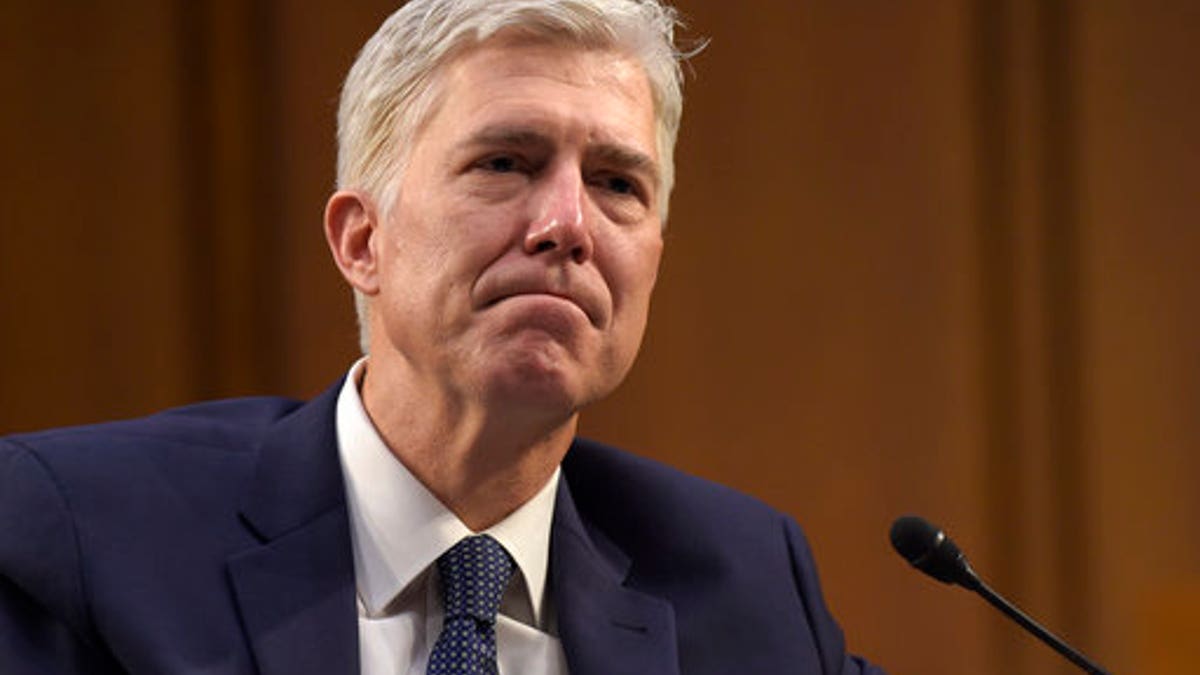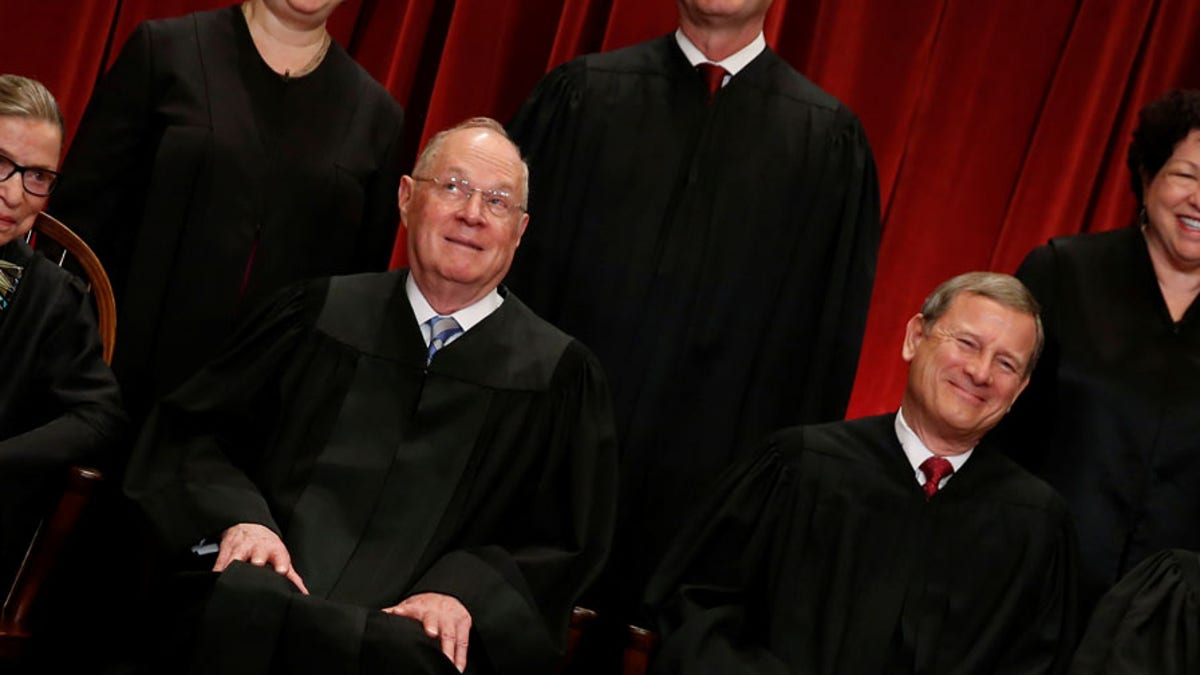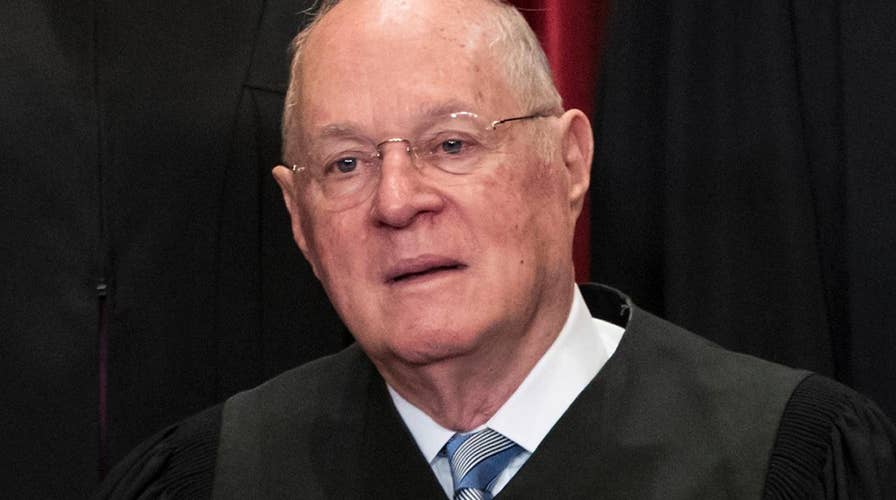Possible replacements for Justice Kennedy
A new Supreme Court vacancy is on its way after Justice Anthony Kennedy announced his plans to retire. Here’s a look at who is being rumored to replace him.
One of the most transformative years in the federal judiciary began with uncertainty and ends on a political high note for President Trump.
The White House, after winning confirmation for Neil Gorsuch to fill the Supreme Court seat held by the late conservative icon Antonin Scalia, has moved with record speed to fill vacancies on the lower federal courts – a surefire way for a president to help cement his legacy.
As of mid-December, 19 of Trump's 66 total nominees this year have been confirmed by the Senate.
By comparison, then-President Barack Obama had made only 26 choices – including Justice Sonia Sotomayor – half of whom were confirmed by mid-December 2009.
The impact under Trump is especially being felt on the appellate level, which could act as insurance of sorts if those judges are more inclined to support his policies as they face legal challenge across the country.

Justice Neil Gorsuch's confirmation to the Supreme Court was the first of many judicial wins in 2017 for President Trump. (AP)
"The importance of this dramatic reshaping of the entire federal court system cannot be overstated," said former House Speaker Newt Gingrich, a Fox News contributor. "While it is easy to focus on the U.S. Supreme Court, lower and appellate court judges will make decisions that impact ordinary Americans on a daily basis for decades to come."
It has not been all smooth for the Trump team. Three nominees were withdrawn by the White House in recent days after questions were raised about their record and temperament. In a confirmation hearing that essentially went viral, then-nominee Matthew Petersen stumbled repeatedly under questioning as he acknowledged not knowing basic trial court terminology, essential if he were to be a trial judge, say legal experts.
Yet, with 143 current vacancies -- almost half of them considered "judicial emergencies" with shorthanded courts and heavy caseloads -- more opportunities await the new president in the new year.
ANOTHER SUPREME DECISION?
Of those opportunities could be another early-term Supreme Court appointment.
With the unusually influential help of outside advisers, Trump made an immediate impact on the country just 11 days after taking office in 2017, choosing Justice Gorsuch to fill Scalia’s Supreme Court seat. The 50-year-old Colorado native -- and youngest justice -- quickly displayed that promised "reliable" conservative record.
Now, White House aides are quietly hopeful they might soon get another chance to move the shaky conservative majority on the bench solidly to the right.
"If a vacancy should arise again, this White House is going to be ready to go. They already have a working list of candidates to fill a seat. They've been through the process once before," said Thomas Dupree, a former top Bush Justice Department official and now an appellate attorney. "So I would say, take the Gorsuch model, and do it again."
Trump might get the chance as early as spring, when retirement announcements from the high court are typically made. Justice Anthony Kennedy -- a moderate-conservative and powerful deciding vote on so many hot-button issues -- tantalized Washington last summer, amid unfounded rumors he would step aside after three decades. The tight-lipped 81-year-old senior associate justice still has given no public indication he is ready to go.
TRUMP ADDS 5 NAMES TO SCOTUS NOMINEE LIST
But Trump already has a list. When Gorsuch was selected, he was among a list of 21 names then-candidate Trump promised he would rely on exclusively to complete the high court. The list of possibles has since expanded to 25, with the latest four added in November.
'The importance of this dramatic reshaping of the entire federal court system cannot be overstated.'
Among those newly added was Judge Brett Kavanaugh, who sits on the same high-profile D.C. appeals court as Merrick Garland – the Obama pick stalled and sidelined by Republicans. Three current justices (and Scalia) came from that appeals bench. Government sources and court watchers say the 52-year-old Kavanaugh, a former law clerk for Kennedy, would be among those seriously considered for any near-term Supreme Court vacancy.
Also in the mix:
- Judge Amul Thapar, 48, on the Cincinnati-based 6th Circuit federal appeals court. While still a district court judge, Thapar was interviewed in January by the president for the Scalia seat, and would become the first Asian-American Supreme Court justice.
- Judge Thomas Hardiman of the Philadelphia-based 3rd Circuit federal appeals court. The 52-year-old Pittsburgh native was the remaining finalist for the seat Gorsuch now holds.
- Judge Joan Larsen, also of the 6th Circuit, also was a former law clerk for Scalia, speaking at his memorial service. Some sources say Larsen, who turns 49 this month and served on Michigan's high court, may need some more federal bench experience before ever reaching the high court.
- Judge Diane Sykes of the Chicago-based 7th Circuit appeals court, has long been a favorite of conservatives, having been considered for the high court in the Bush years. She too was a Trump high court finalist, but her age -- she turns 60 this month -- may be a factor for a president seeking a justice with a potentially longer tenure.
The planning, of course, all presumes a new vacancy will occur in Trump's first term. Justice Ruth Bader Ginsburg, at 84 the oldest member of the court, has privately indicated she has no intention of leaving. Kennedy too may decide to stay for another year at least.
"He is aware, as we all are, that Trump promised to put justices on the court who would overturn Roe v. Wade, who would perhaps undermine equal rights for gays and lesbians," said Elizabeth Wydra, president of the Constitutional Accountability Center. "So he is not going to be eager to throw that legacy away. The best steward of Justice Kennedy's legacy is Justice Kennedy, and that will give him an impetus to stay on the bench."
VACANCY STARES
Conservative activists concede having Kennedy on the bench creates a measure of uncertainty into the new year, concerning whether many of the president's legislative priorities will survive judicial scrutiny.
The so-called "travel ban" cases are working their way through the appeals process and could reach the justices this spring. The third version of Trump's immigration and visitor policies includes a ban on travel into the U.S. from six mostly Muslim countries. The case could be major test of executive authority over foreign policy and immigration.
Other pending court challenges where Republicans on Capitol Hill and the White House could face court setbacks include gun control, gerrymandering, religious freedom, abortion, transgender servicemembers in the military, and the war on terror.

Is Justice Anthony Kennedy next to retire? (Reuters)
But those issues may have a harder time reaching the justices if the various lower courts speak with one voice on such hot-button disputes. Since the Supreme Court is a purely discretionary body -- taking only those cases it wants to resolve, and typically only when there are differing legal interpretations in the lower courts -- many issues remain on the judicial back burner.
That, legal experts say, puts a priority on Trump ensuring the 874 federal judgeships with lifetime tenure remain mostly right-leaning. And they have so far, with the Senate's help. Gone is the 60-vote, filibuster-proof threshold required to confirm judicial candidates. Gorsuch benefitted from a simple 51-vote majority to earn his seat, after rule changes engineered by Senate Majority Leader Mitch McConnell, R-Ky..
Many advocacy groups on the left remain frustrated.
“The judicial nominations process is spinning out of control under the Trump administration," said Nan Aron, president and founder of the Alliance for Justice. "It is disgraceful that in their stampede to rush through as many judicial nominees as possible, Republican partisans on the Judiciary Committee continue to trample basic standards for nominees, longstanding Senate practice and their own Democratic colleagues."
Trump has given credit for his third branch successes to several mostly obscure conservative legal minds, who provided outside resources and advice during the Gorsuch selection and confirmation drama. That includes Leonard Leo, who took a leave of absence from the Federalist Society to be the president's private point man on all things judges. He says Trump would be ready if given another chance to burnish his legacy.
"I think it's important the president and the Republican Party continue to pick individuals to the Supreme Court who are really committed to the ideals that Justice Scalia stood for. Those play well with the American people, those are the right ideals for moving the court forward, and that worked" with the Gorsuch confirmation, Leo told Fox News.
When it comes to the selection process, "The president is very entrepreneurial, he's always open to new ideas. But I think the Gorsuch nomination tells you everything you need to know about what he's looking for, and that I don't think will change at all."













































